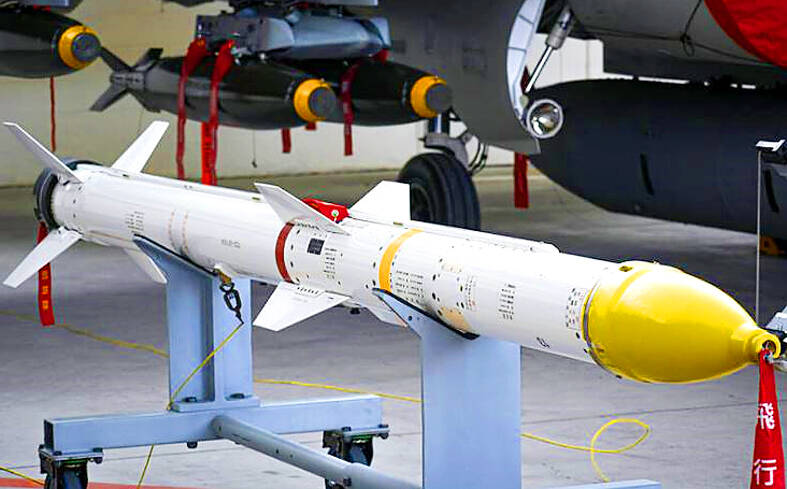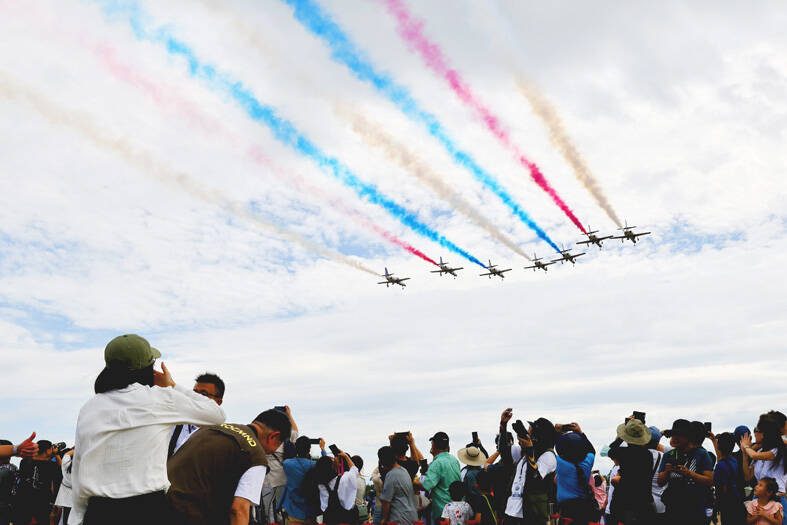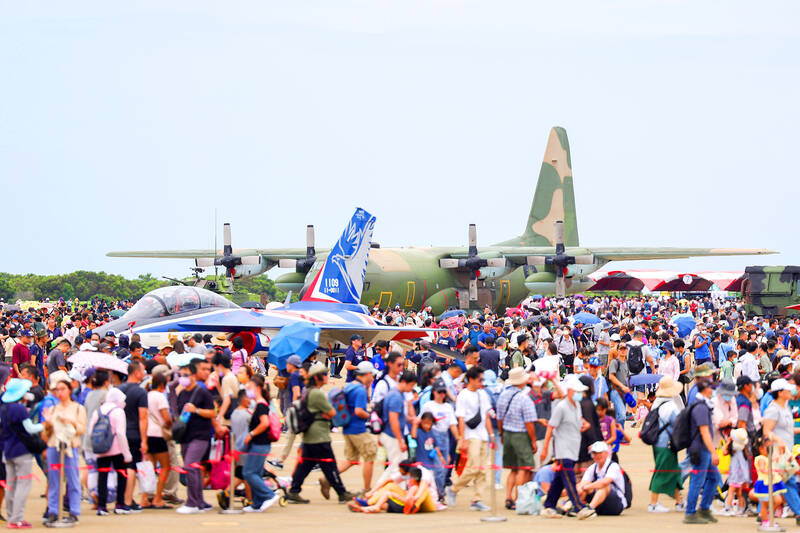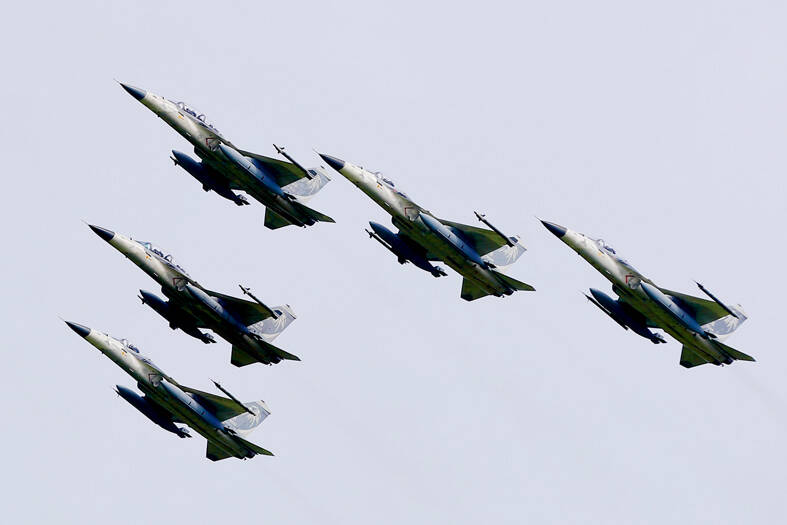The air force’s proposed next-generation fighter jet is to be armed with a new Tien Chien missile to be developed by the Chungshan Institute of Science and Technology, a high-ranking defense official said yesterday.
The missile, tentatively named Tien Chien V, is to have a range of 160km, equivalent to the US-made AIM-120C-8, the official said, speaking on condition of anonymity.
The weapon is based on the Tien Chien II medium-range air-to-air missile, they added.

Photo: Liu Yu-chieh, Taipei Times
Tien Chien V missiles would be compatible with domestically made joint helmet-mounted cueing systems and have improved anti-jamming capabilities, which would enhance the speed of target acquisition and pilots’ ability to counter enemy electronic warfare, the source said.
The new missile is needed to meet the next-generation fighter’s operational requirements and design parameters, as the air force has specified that the jet must utilize an internal weapons bay to enable stealth capabilities, they said.
The jet might incorporate vector thrust and advanced avionics, including active electronically scanned array radar and a tactical data link, they said, adding that the air force has yet to make a final decision on the platform’s capabilities.

Photo: Ritchie B. Tongo, EPA-EFE
The Chungshan Institute makes the Tien Chien I short-range air-to-air missiles and the medium-range Tien Chien II, in addition to the latter’s ship-launched and ground vehicle-mounted derivatives, which it refers to as Tien Chien III, the official said.
The developers skipped the name Tien Chien IV, they said.
Separately, President Tsai Ing-wen (蔡英文) yesterday said that a Ching Chuan Kang Air Base “open house” event in Taichung was intended to educate Taiwanese about the armed forces’ achievements in preparing the nation’s defense.

Photo: CNA
In a post on Facebook, Tsai called for support and appreciation for military service members.
After a three-year hiatus of the air shows due to the COVID-19 pandemic, this year’s open house featured a demonstration by the Thunder Tigers Aerobatics Team, a showcase of the military’s main combat aircraft, military band performances and displays that included nearly 100 stands.
Taiwan’s domestically designed AIDC T-5 Brave Eagle trainer jets conducted a flyover in a formation of five, marking a first for that type of aircraft.

Photo: Ritchie B. Tongo, EPA-EFE
Lockheed Martin F-16Vs, Dassault Mirage 2000s and AIDC Indigenous Defense Fighters were among the other tactical aircraft that carried out aerial demonstrations at the event.
The army and the navy, which also participated in the event, displayed vehicles and weapons systems currently in service, including the Boeing AH-64 Apache attack helicopter, Sikorsky UH-60 Black Hawk helicopter, armored fighting vehicles, Hsiung Feng II and Hsiung Feng III missiles, and the Chungshan Institute-developed Albatross drone and Cardinal uncrewed combat aerial vehicle.

CHAOS: Iranians took to the streets playing celebratory music after reports of Khamenei’s death on Saturday, while mourners also gathered in Tehran yesterday Iranian Supreme Leader Ayatollah Ali Khamenei was killed in a major attack on Iran launched by Israel and the US, throwing the future of the Islamic republic into doubt and raising the risk of regional instability. Iranian state television and the state-run IRNA news agency announced the 86-year-old’s death early yesterday. US President Donald Trump said it gave Iranians their “greatest chance” to “take back” their country. The announcements came after a joint US and Israeli aerial bombardment that targeted Iranian military and governmental sites. Trump said the “heavy and pinpoint bombing” would continue through the week or as long

TRUST: The KMT said it respected the US’ timing and considerations, and hoped it would continue to honor its commitments to helping Taiwan bolster its defenses and deterrence US President Donald Trump is delaying a multibillion-dollar arms sale to Taiwan to ensure his visit to Beijing is successful, a New York Times report said. The weapons sales package has stalled in the US Department of State, the report said, citing US officials it did not identify. The White House has told agencies not to push forward ahead of Trump’s meeting with Chinese President Xi Jinping (習近平), it said. The two last month held a phone call to discuss trade and geopolitical flashpoints ahead of the summit. Xi raised the Taiwan issue and urged the US to handle arms sales to

State-run CPC Corp, Taiwan (CPC, 台灣中油) yesterday said that it had confirmed on Saturday night with its liquefied natural gas (LNG) and crude oil suppliers that shipments are proceeding as scheduled and that domestic supplies remain unaffected. The CPC yesterday announced the gasoline and diesel prices will rise by NT$0.2 and NT$0.4 per liter, respectively, starting Monday, citing Middle East tensions and blizzards in the eastern United States. CPC also iterated it has been reducing the proportion of crude oil imports from the Middle East and diversifying its supply sources in the past few years in response to geopolitical risks, expanding

Pro-democracy media tycoon Jimmy Lai’s (黎智英) fraud conviction and prison sentence were yesterday overturned by a Hong Kong court, in a surprise legal decision that comes soon after Lai was jailed for 20 years on a separate national security charge. Judges Jeremy Poon (潘兆初), Anthea Pang (彭寶琴) and Derek Pang (彭偉昌) said in the judgement that they allowed the appeal from Lai, and another defendant in the case, to proceed, as a lower court judge had “erred.” “The Court of Appeal gave them leave to appeal against their conviction, allowed their appeals, quashed the convictions and set aside the sentences,” the judges